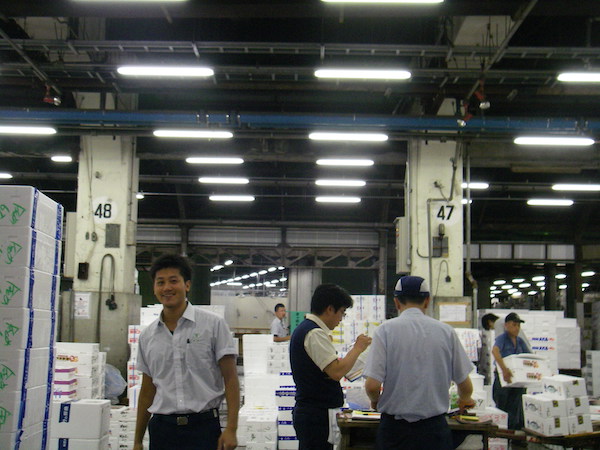第六回 3つ目の出会い
漁獲1回に対して、食べられるのに捨てられている魚が予想以上にいる。
どうすれば、こういう不遇な魚たちを減らすことが出来るのだろうか。
毎週のように都内から伊豆半島まで通い、漁師と苦楽を共にし、暑い日も寒い日も漁に同行、彼の地道な研究は進んでいった。
その解決方法は主として2つの考え方に大別出来る。
1つ目は「獲れないようにする工夫」、もう一つは「獲れてしまったものを有用活用する工夫」だ。
捨てられる魚は小型魚中心で網目を大きくする・時期を調整する等で減らすことが出来る。
また、後者については「市場価値の創出」だ。
未利用資源をどう商品化し、それをどう販売していくか。
後にこの視座が「築地セリ人・疋田」としての市場価値すら高めていく事になる。
ほぼ毎週末、漁に同行し、彼は一つの真理に達した。
「餅屋は餅屋」、つまり「漁師は漁師として生きる。魚を獲るプロにどこまでも徹する事」。
現在の風潮として政府含め、漁業効率化や流通簡略化を謳って久しいが、やはり時間軸の制約も含めて、それには限界がある。
早朝から波風に揺られた身体は想像以上に疲れている。
陸に上がった後に自分で獲った魚を加工し流通・販売させ、会社会計も行う等、本当に無理な要求だ。
また研究によって、彼はもう一つの真理も見つけていた。
それは、事件は現場で起こっているではないが、「全ては漁獲時に決まっている」ということだ。
言い換えるならば、「魚は現場での取り扱いでその後が全て決まってしまう」ということであり、どれだけ鮮度感含めた品質に注視出来るかだ。
彼は、自らの視座を「現場」に置く意味を「強み・差別化」へと将来活用していくことになる。
Episode 6. The third encounter.
21 October. 2019
Every fishing trip, there were lots more dumped fish than I expected.
How could I reduce the number of these unfortunate fish?
I went to the Izu Peninsula from Tokyo almost every week and I shared happy times and sad times with the fishermen.
I joined in fishing on both hot and cold days, and my research progressed.
The solutions can be roughly divided into two methods.
The first method is “How to prevent catching them”, and the second one is “How to use fish effectively that are caught unexpectedly.”
Most dumped fish are small fish, so we can increase the mesh size and adjust the timing of the fishing season.
The second one also can be called “Creating the commercial value.”
How can we commercialize and sell unused resources?
Eventually, this viewpoint would become valuable for “Takuya as a fish auctioneer”.
I discovered a deep truth through the experience of fishing almost every week.
“Mochi wa Mochi-ya.” (It means one should go to specialists for the best results). What I’m trying to say is, “Fishermen spend their lives as fishermen.
We need to be a professional to catch fish.”
It has been a long time since the government encouraged the seafood industry to promote fishery efficiency and distribution simplification.
After all, there are limits to that, including restrictions on the working time.
The fishermen’s body is very tired after fishing because they work from early in the morning, and their body is swayed by the waves and salty breeze.
It’s unreasonable to request that the fisherman also process the fish that they caught, and do the distribution and sales, and do the business accounting.
I also found another truth through my research.
“Everything is decided when it is caught.” In other words, I can say “The handling of fish on site will determine everything after that.
” It determines how much you can pay attention to the quality including the freshness.
I will use my point of view on the GEMBA (“the place where the production happens”) as my strength and differentiation in the future.
